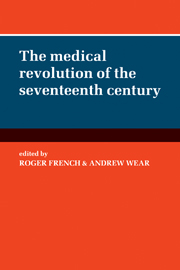Book contents
- Frontmatter
- Contents
- List of contributors
- Acknowledgements
- Introduction
- 1 Medicine, religion and the puritan revolution
- 2 Harvey in Holland: circulation and the Calvinists
- 3 The matter of souls: medical theory and theology in seventeenth-century England
- 4 Mental illness, magical medicine and the Devil in northern England, 1650–1700
- 5 Passions and the ghost in the machine: or what not to ask about science in seventeenth- and eighteenth-century Germany
- 6 Thomas Sydenham: epidemics, experiment and the ‘Good Old Cause’
- 7 The medico-religious universe of an early eighteenth-century Parisian doctor: the case of Philippe Hecquet
- 8 Isaac Newton, George Cheyne and the Principia Medicinae
- 9 Physicians and the new philosophy: Henry Stubbe and the virtuosi-physicians
- 10 The early Royal Society and the spread of medical knowledge
- 11 Medical practice in late seventeenth-and early eighteenth-century England: continuity and union
- Index
9 - Physicians and the new philosophy: Henry Stubbe and the virtuosi-physicians
Published online by Cambridge University Press: 05 January 2012
- Frontmatter
- Contents
- List of contributors
- Acknowledgements
- Introduction
- 1 Medicine, religion and the puritan revolution
- 2 Harvey in Holland: circulation and the Calvinists
- 3 The matter of souls: medical theory and theology in seventeenth-century England
- 4 Mental illness, magical medicine and the Devil in northern England, 1650–1700
- 5 Passions and the ghost in the machine: or what not to ask about science in seventeenth- and eighteenth-century Germany
- 6 Thomas Sydenham: epidemics, experiment and the ‘Good Old Cause’
- 7 The medico-religious universe of an early eighteenth-century Parisian doctor: the case of Philippe Hecquet
- 8 Isaac Newton, George Cheyne and the Principia Medicinae
- 9 Physicians and the new philosophy: Henry Stubbe and the virtuosi-physicians
- 10 The early Royal Society and the spread of medical knowledge
- 11 Medical practice in late seventeenth-and early eighteenth-century England: continuity and union
- Index
Summary
Where Practitioners of Physick are altogether illiterate, there oftentimes Specificks may be best met with.
Robert Boyle, The Usefulnesse of Experimental Naturall PhilosophyThat reasoning [is] equally absurd, which pleads for the Empericks to be countenanced as if their experimentings might very much further this pretended Reformation in Physick.
Nathaniel Hodges, Vindiciae Medicinae et MedicorumAs the new philosophy gained in popularity and persuasiveness in England in the later seventeenth century, London physicians became embroiled in a number of disputes. Various aspects of the new philosophy challenged parts of the established outlook held by university-trained physicians. The disputes in which physicians became engaged concerned both intellectual and professional issues, for they involved arguments about both the intellectual foundations and the practice of academic physic. The arguments cannot be characterized simply as quarrels between physicians and their medical rivals, be they apothecaries, chemists, or virtuosi, for the physicians themselves as well as their opponents were divided in their opinions about how they ought to respond to the challenges of the new philosophy. Some physicians vigorously touted the advantages of the new philosophy, while others pointed to the dangers of moving too far from the established ways that made physicians different from other medical practitioners. Because the intellectual issues were so important to the profession of physic, quarrels among physicians and between themselves and others undoubtedly would have arisen in a wide range of circumstances. But in restoration England, a variety of institutional issues complicated the arguments.
- Type
- Chapter
- Information
- The Medical Revolution of the Seventeenth Century , pp. 246 - 271Publisher: Cambridge University PressPrint publication year: 1989
- 8
- Cited by



